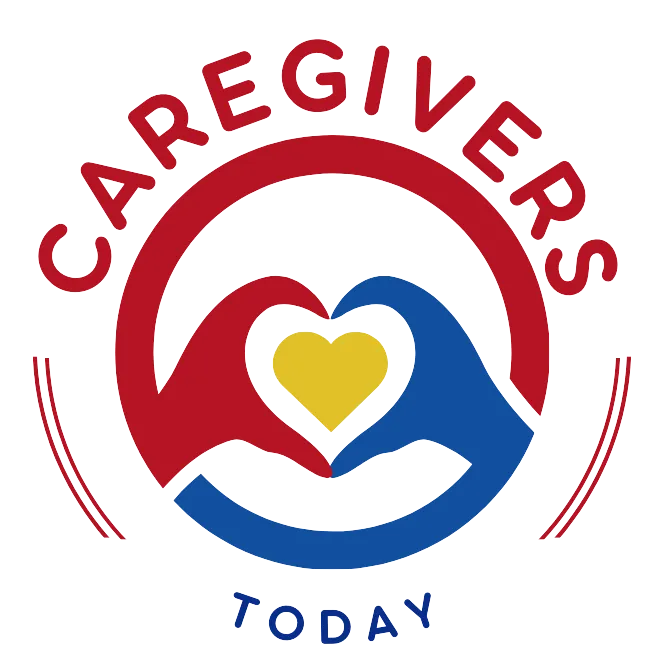
Proven Framework for Success
Our Calm Caregiving Course is designed and facilitated by experts in caregiving, with over two decades of hands-on experience and proven results in mentoring other caregivers.

Practical and Actionable Advice
Our coaches provide practical strategies for managing the day-to-day challenges of caregiving, as well as skills and techniques that can reshape the way you approach caregiving.

Empowered Caregivers
Join a community of caregivers, dedicated to the art of caregiving,
who uplift each other, spread knowledge, and empower every caregiver to provide the best possible care.

20k+Patients

20k+Families

500+Caregivers

About
Caregivers Today
Caregivers Today was launched by Alex J. Buison, to help caregivers by creating a community that can support and uplift each other. It's founded on his commitment to honor the legacy of those who cared for him and his dedication to passing the torch, spreading knowledge, and empowering every caregiver to provide the best possible care.
Are you ready to take control, transform your caregiving journey and become an empowered leader in our community?
Master stress management
Learn practical strategies to manage the day-to-day challenges of caregiving
Improve your quality of life as well as that of the person you're caring for
Reignite your passion
Revolutionize your approach
Acquire the tools and skills to teach and inspire others
Products & Services
Discover Our Top-Rated Skills Elevate Your Expertise with the Best Courses for Learning and Mastering Essential Abilities.
23,000+ more skillful courses you can explore
Upcoming Events
Our affiliate courses are designed by experts who have years of experience and proven results in the affiliate marketing industry.

Self-Care Strategies: Balancing Your Needs with Caregiving Responsibilities
Introduction
Caregiving for a loved one with dementia is a demanding and emotionally taxing role that requires a significant amount of time, energy, and compassion. While it’s natural for caregivers to prioritize the needs of their loved ones, neglecting their own well-being can lead to burnout, physical exhaustion, and emotional distress. Striking a balance between caregiving responsibilities and personal self-care is not just important—it’s essential for sustaining your health and providing the best possible care. In this blog, we’ll explore self-care strategies designed specifically for dementia caregivers, offering practical advice on how to maintain your own well-being while fulfilling your caregiving duties.
Self-Care Techniques

Setting Boundaries
One of the most challenging aspects of caregiving is learning how to set and maintain boundaries. Caregivers often feel an overwhelming sense of duty, which can make it difficult to say "no" or carve out personal time. However, without clear boundaries, it’s easy to become overwhelmed and lose sight of your own needs.
Here are some strategies for setting boundaries:
Define Your Limits: Be honest with yourself about what you can realistically handle. Determine how much time and energy you can devote to caregiving without compromising your own well-being. Communicate these limits clearly with family members, healthcare providers, and even the person you are caring for.
Schedule Personal Time: Set aside specific times during the day or week that are dedicated solely to your personal needs. This could be as simple as a daily walk, time to read a book, or a regular night off. Treat this time as non-negotiable, and don’t be afraid to ask for help or delegate tasks to others to ensure you get it.
Learn to Say "No": It’s okay to decline additional responsibilities or requests that would stretch you too thin. Saying "no" when necessary is a powerful act of self-care that helps preserve your energy and focus on what’s most important.
By establishing and maintaining boundaries, you protect your personal time and space, making it possible to recharge and continue your caregiving responsibilities without becoming depleted.
Prioritizing Health
Your physical health is the foundation of your ability to provide care. Unfortunately, caregivers often put their own health on the back burner, leading to exhaustion and illness. Prioritizing your health is not a luxury; it’s a necessity that enables you to be an effective caregiver.
Consider these tips for maintaining your health:
Get Enough Sleep: Sleep is essential for physical and mental well-being. Aim for 7-8 hours of quality sleep each night. If caregiving responsibilities disrupt your sleep, explore options for respite care or enlist the help of family members to give you a chance to rest.
Exercise Regularly: Physical activity is a powerful tool for reducing stress, improving mood, and boosting energy levels. Even short bursts of exercise, such as a 10-minute walk or a quick yoga session, can make a big difference in how you feel.
Eat Nutritious Foods: A balanced diet rich in fruits, vegetables, lean proteins, and whole grains provides the energy and nutrients your body needs to function at its best. Avoid relying on caffeine or sugary snacks to get through the day, as they can lead to energy crashes and mood swings.
By prioritizing your health, you ensure that you have the physical and mental stamina needed to meet the demands of caregiving. Healthy habits also set a positive example for the person you are caring for and can improve their overall well-being as well.
Hobbies and Interests
Engaging in hobbies and personal interests is an important aspect of self-care that is often overlooked by caregivers. Pursuing activities you enjoy provides a much-needed mental break from caregiving and helps maintain your identity outside of your caregiving role.
Here’s how to make time for your hobbies:
Revisit Old Hobbies: Think about the activities you used to enjoy before you became a caregiver. Whether it’s painting, gardening, reading, or playing an instrument, try to incorporate these hobbies back into your life.
Explore New Interests: Caregiving can be an opportunity to discover new hobbies or interests. Consider trying something new, like a cooking class, photography, or a craft project. New activities can provide a sense of accomplishment and joy.
Join a Group: Participating in group activities related to your hobbies can also provide social interaction and support. Whether it’s a book club, a fitness class, or a community group, engaging with others who share your interests can be a refreshing change from caregiving duties.
Pursuing hobbies and interests is not just about leisure; it’s a crucial component of self-care that helps you recharge, reduce stress, and maintain a sense of balance in your life.
Benefits of Self-Care

Reduced Burnout
Caregiver burnout is a state of physical, emotional, and mental exhaustion that can occur when you neglect your own needs for too long. Burnout can manifest as feelings of helplessness, irritability, and detachment, and it can severely impact your ability to provide care. Regular self-care practices can significantly reduce the risk of burnout by allowing you to recharge and maintain your energy levels.
By incorporating self-care into your daily routine, you create a buffer against the stresses of caregiving. This not only helps you avoid burnout but also ensures that you are in the best possible condition to care for your loved one.
Enhanced Caregiving
It’s often said that you can’t pour from an empty cup. When you take care of yourself, you are better equipped to take care of others. Self-care enables you to be more patient, compassionate, and attentive, qualities that are essential for effective caregiving.
When you are well-rested, nourished, and emotionally balanced, you can approach caregiving tasks with greater clarity and focus. This leads to better decision-making, more effective problem-solving, and a more positive caregiving experience for both you and your loved one.
Emotional Balance
Caregiving can be an emotional rollercoaster, with highs of joy and connection, and lows of frustration and sadness. Without proper self-care, it’s easy to become overwhelmed by these emotions. Regular self-care practices help you maintain emotional balance and resilience.
Techniques such as mindfulness, meditation, and journaling can help you process your emotions and keep them in check. By taking time to reflect and care for your emotional needs, you build resilience that allows you to navigate the challenges of caregiving with greater ease and grace.
Improved Relationships
Taking time for self-care can also improve your relationships with those around you, including the person you are caring for. When you are less stressed and more balanced, you are likely to have more patience and a more positive attitude. This can lead to more harmonious interactions and a stronger emotional connection with your loved one.
In addition, maintaining your social connections outside of caregiving is vital. Spending time with friends and family, even if just for a quick phone call or a coffee break, can provide emotional support and help you feel more connected and less isolated.
Conclusion
Balancing your own needs with caregiving responsibilities is not just important—it’s essential for your health and well-being. By implementing self-care strategies such as setting boundaries, prioritizing your health, and engaging in hobbies and interests, you can reduce the risk of burnout, enhance your caregiving abilities, and maintain emotional balance.
Remember, self-care is not a luxury or an indulgence; it’s a necessary part of being a caregiver. By taking care of yourself, you are not only ensuring your own well-being but also providing the best possible care for your loved one. Make self-care a priority, and you will find that both you and the person you care for will benefit greatly.
News & Updates

Self-Care Strategies: Balancing Your Needs with Caregiving Responsibilities
Introduction
Caregiving for a loved one with dementia is a demanding and emotionally taxing role that requires a significant amount of time, energy, and compassion. While it’s natural for caregivers to prioritize the needs of their loved ones, neglecting their own well-being can lead to burnout, physical exhaustion, and emotional distress. Striking a balance between caregiving responsibilities and personal self-care is not just important—it’s essential for sustaining your health and providing the best possible care. In this blog, we’ll explore self-care strategies designed specifically for dementia caregivers, offering practical advice on how to maintain your own well-being while fulfilling your caregiving duties.
Self-Care Techniques

Setting Boundaries
One of the most challenging aspects of caregiving is learning how to set and maintain boundaries. Caregivers often feel an overwhelming sense of duty, which can make it difficult to say "no" or carve out personal time. However, without clear boundaries, it’s easy to become overwhelmed and lose sight of your own needs.
Here are some strategies for setting boundaries:
Define Your Limits: Be honest with yourself about what you can realistically handle. Determine how much time and energy you can devote to caregiving without compromising your own well-being. Communicate these limits clearly with family members, healthcare providers, and even the person you are caring for.
Schedule Personal Time: Set aside specific times during the day or week that are dedicated solely to your personal needs. This could be as simple as a daily walk, time to read a book, or a regular night off. Treat this time as non-negotiable, and don’t be afraid to ask for help or delegate tasks to others to ensure you get it.
Learn to Say "No": It’s okay to decline additional responsibilities or requests that would stretch you too thin. Saying "no" when necessary is a powerful act of self-care that helps preserve your energy and focus on what’s most important.
By establishing and maintaining boundaries, you protect your personal time and space, making it possible to recharge and continue your caregiving responsibilities without becoming depleted.
Prioritizing Health
Your physical health is the foundation of your ability to provide care. Unfortunately, caregivers often put their own health on the back burner, leading to exhaustion and illness. Prioritizing your health is not a luxury; it’s a necessity that enables you to be an effective caregiver.
Consider these tips for maintaining your health:
Get Enough Sleep: Sleep is essential for physical and mental well-being. Aim for 7-8 hours of quality sleep each night. If caregiving responsibilities disrupt your sleep, explore options for respite care or enlist the help of family members to give you a chance to rest.
Exercise Regularly: Physical activity is a powerful tool for reducing stress, improving mood, and boosting energy levels. Even short bursts of exercise, such as a 10-minute walk or a quick yoga session, can make a big difference in how you feel.
Eat Nutritious Foods: A balanced diet rich in fruits, vegetables, lean proteins, and whole grains provides the energy and nutrients your body needs to function at its best. Avoid relying on caffeine or sugary snacks to get through the day, as they can lead to energy crashes and mood swings.
By prioritizing your health, you ensure that you have the physical and mental stamina needed to meet the demands of caregiving. Healthy habits also set a positive example for the person you are caring for and can improve their overall well-being as well.
Hobbies and Interests
Engaging in hobbies and personal interests is an important aspect of self-care that is often overlooked by caregivers. Pursuing activities you enjoy provides a much-needed mental break from caregiving and helps maintain your identity outside of your caregiving role.
Here’s how to make time for your hobbies:
Revisit Old Hobbies: Think about the activities you used to enjoy before you became a caregiver. Whether it’s painting, gardening, reading, or playing an instrument, try to incorporate these hobbies back into your life.
Explore New Interests: Caregiving can be an opportunity to discover new hobbies or interests. Consider trying something new, like a cooking class, photography, or a craft project. New activities can provide a sense of accomplishment and joy.
Join a Group: Participating in group activities related to your hobbies can also provide social interaction and support. Whether it’s a book club, a fitness class, or a community group, engaging with others who share your interests can be a refreshing change from caregiving duties.
Pursuing hobbies and interests is not just about leisure; it’s a crucial component of self-care that helps you recharge, reduce stress, and maintain a sense of balance in your life.
Benefits of Self-Care

Reduced Burnout
Caregiver burnout is a state of physical, emotional, and mental exhaustion that can occur when you neglect your own needs for too long. Burnout can manifest as feelings of helplessness, irritability, and detachment, and it can severely impact your ability to provide care. Regular self-care practices can significantly reduce the risk of burnout by allowing you to recharge and maintain your energy levels.
By incorporating self-care into your daily routine, you create a buffer against the stresses of caregiving. This not only helps you avoid burnout but also ensures that you are in the best possible condition to care for your loved one.
Enhanced Caregiving
It’s often said that you can’t pour from an empty cup. When you take care of yourself, you are better equipped to take care of others. Self-care enables you to be more patient, compassionate, and attentive, qualities that are essential for effective caregiving.
When you are well-rested, nourished, and emotionally balanced, you can approach caregiving tasks with greater clarity and focus. This leads to better decision-making, more effective problem-solving, and a more positive caregiving experience for both you and your loved one.
Emotional Balance
Caregiving can be an emotional rollercoaster, with highs of joy and connection, and lows of frustration and sadness. Without proper self-care, it’s easy to become overwhelmed by these emotions. Regular self-care practices help you maintain emotional balance and resilience.
Techniques such as mindfulness, meditation, and journaling can help you process your emotions and keep them in check. By taking time to reflect and care for your emotional needs, you build resilience that allows you to navigate the challenges of caregiving with greater ease and grace.
Improved Relationships
Taking time for self-care can also improve your relationships with those around you, including the person you are caring for. When you are less stressed and more balanced, you are likely to have more patience and a more positive attitude. This can lead to more harmonious interactions and a stronger emotional connection with your loved one.
In addition, maintaining your social connections outside of caregiving is vital. Spending time with friends and family, even if just for a quick phone call or a coffee break, can provide emotional support and help you feel more connected and less isolated.
Conclusion
Balancing your own needs with caregiving responsibilities is not just important—it’s essential for your health and well-being. By implementing self-care strategies such as setting boundaries, prioritizing your health, and engaging in hobbies and interests, you can reduce the risk of burnout, enhance your caregiving abilities, and maintain emotional balance.
Remember, self-care is not a luxury or an indulgence; it’s a necessary part of being a caregiver. By taking care of yourself, you are not only ensuring your own well-being but also providing the best possible care for your loved one. Make self-care a priority, and you will find that both you and the person you care for will benefit greatly.
What Our Customers Are Saying

"As a new caregiver, I was overwhelmed and unsure of where to start until I joined Caregivers Today. Their expertise, patience, and practical advice have equipped me with the skills and confidence I needed to provide the best care possible. I highly recommend their Calm Caregiving Course to any new caregiver seeking guidance and support."

Cody

"Before joining Caregivers Today, I was completely burned out and struggling to manage my caregiving responsibilities. Their insightful guidance and empathetic approach not only rejuvenated my passion for caregiving but also provided me with effective techniques to prevent burnout. I highly recommend the Calm Caregiving Course to any caregiver in need of support and revitalization."

Kristin

"Being part of the Caregivers Today community has been a game-changer for me. Their deep knowledge, strategic insights, and encouragement have empowered me to not only enhance my caregiving skills but also to inspire and support others in my community. I highly recommend their training to any caregiver aspiring to make a broader impact."

Albert
Are you ready to take control, transform your caregiving journey and become an empowered leader in our community?
Our affiliate courses are designed by experts who have years of experience and proven results in the affiliate marketing industry.
Frequently Asked Questions
Let's answer any of your questions
Can I get paid to care for a family member?
We receive hundreds of calls every year from family and friends asking, “How can I get paid to care?” These caregivers aren’t asking for a handout, they are simply trying to find a way to make ends meet while dedicating their time to caregiving. Unfortunately, very few programs pay family members or friends on a regular basis to provide care. Medicare (government health insurance for people age 65 and older) does not pay for long-term care services, such as in-home care and adult day services, whether or not such services are provided by a direct care worker or a family member. Sometimes, however, caregiving families may obtain financial relief for specific purposes, such as for respite care or to purchase goods and services, and in some cases, pay for caregiving. In some states there are programs that pay family members to provide care to those receiving Medicaid (government health insurance for low-income people — this program may go by a different name in your state). And in a very few states there are programs available to those who do not qualify for Medicaid. NOTE: These programs vary widely, often with complicated criteria for eligibility.
How can I find someone to help care for my family member at home?
Many older or disabled adults live at home but need daily assistance with a broad range of activities such as bathing, dressing, eating and taking their medications. They may also need assistance with household chores, such as cooking, cleaning and laundry. As a friend or relative, you may find it difficult to provide all of that help on your own. If you are providing care on a daily, weekly or even monthly basis, you may find that you need help or need a break. A variety of services are available to assist you and your family member.
Generally, two types of care in the home are available: home health care services and in-home care services. If your family member requires regular assistance with health care needs, home health care organizations and skilled nursing agencies may be the best choice for you. They can provide a range of medical services, such as medication assistance, nursing services, physical therapy and medical social services to coordinate care among health care providers. Medicare, Medicaid and a number of private insurance policies pay for some home health care services, with certain restrictions. For example, Medicare will cover limited home health care for homebound beneficiaries who need intermittent skilled nursing or therapy services as prescribed by a physician. Many families, however, have to pay out of pocket for home health care services.
How can I deal with my family member’s challenging behaviors without losing my patience?
People with cognitive impairment may exhibit a range of frustrating behavioral problems. These might include communication difficulties, becoming fixated on an idea or constantly repeating a question, aggressive or impulsive behaviors, paranoia, lack of motivation, memory problems, incontinence, poor judgment and wandering. Common causes of cognitive impairment include Alzheimer’s disease and related dementias, stroke, Parkinson’s disease, brain injury, brain tumor or HIV-associated dementia.
Various strategies can help you deal with challenging behaviors. In many communities, the Family Caregiver Support Program or another community organization offers classes and training sessions that teach skills useful in handling troublesome behavior. There you can receive information about your relative’s ability to understand and communicate. Joining a support group also can be helpful. A support group is a good place to share your frustrations and discuss coping strategies with people who are in the same situation, caring for their family members or friends. While many support groups meet in person, online and telephone groups also exist.
It’s important to remember that it’s the disease, not the person, causing the behavior. Anticipating that there will be ups and downs through the illness can provide important perspective to help, maintain your patience. Compassion and a sense of humor also may enable you to cope more effectively with difficult behavior.



